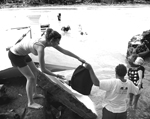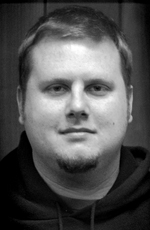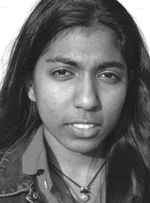By Nathan Hathaway

Washington Post reporter Michael Dobbs' family members help
each other walk across a flooded area in Taprobane, Sri Lanka
after the tsunami. Washington Post photo by
Michael Doobs |
When Peter Dwight woke up in his vacation bungalow
in the Phi Phi islands in Thailand on Dec. 26, his first reaction
had nothing to do with a tsunami. His first thought was “who
turned off the air conditioning? We’re trying to take a nap.”
“I didn’t feel an earthquake, I didn’t feel a
wave,” Dwight said. “The power went out and people started
panicking.
Dwight, a 23-year-old Fresno State senior who works in the office
of Institutional Research, Planning and Assessment , was in Thailand
vacationing with his family when the most deadly tsunami in history
hit southeast Asia last month.
Dwight grew up in Taiwan, where his parents serve as religious missionaries,
and spent the winter holidays with his family.
After being woken by the lack of air conditioning—December
is a summer month in Thailand and the weather is hot and humid,
Dwight said—Dwight looked down the hill from his bungalow
and saw nothing but dirty water where there was a white sandy beach.
Dwight and five others, including his parents, spent about 30 minutes
doing CPR on a woman who had been swept out to sea and washed ashore
about 20 minutes later. The group stopped CPR after it was apparent
the woman had no pulse.
| 
Tsunami survivor Peter Dwight was in Thailand
with his family when the tsunami hit. |
Things could have been a lot worse for Dwight
and his family. His mother had originally tried to get the family
vacation bungalows closer to the beach, but to accommodate Dwight’s
family of seven, they needed three bungalows. A resort on a hill
above the beach was the only one that had three available.
As it was, the resort on the hill where Dwight and his family were
staying was the only one unaffected by the rising water.
“I didn’t feel we were even close to (being among) the
casualties,” Dwight said. “But it could have been really
different.”
At first, the tsunami didn’t strike Dwight as having such
far-reaching effects.
“At the time, I figured it was probably just like a little
local thing, probably not that big,” Dwight said.
“They wouldn’t hear about it in Fresno. Until I watched
the news [after leaving the island] and even got back [to Fresno],
I didn’t think people were really worrying as much.”
“I remember throughout the first night, I was like ‘oh,
if we can’t get off [the island], it’ll probably clear
up and we can go on with our vacation,’ because we had five
more days there.”
Instead, the island was evacuated the following morning.
Despite the devestation he witnessed, Dwight seems largely unfazed
by the experience.
“I’m a pretty easy-going guy,” he said. “I
wasn’t traumatized to the point I would never go back to Thailand
again, or to the Southeast again.”
|
By Maurice O. Ndole
The Indian Ocean tsunami, which has killed more
than 150,000 people in several countries in Asia and Africa, killed
at least five relatives of a Fresno State student in the coastal
town of Hambantota, Sri Lanka.
Senior Suki Nawaz said the tsunami killed her three uncles, an aunt
and a cousin.
| 
Suki Nawaz |
Nawaz, who was born in Hambantota, a town where
the tsunami killed more than 30,000 people, said she knew something
was wrong Dec. 26, when she received a call from her father at around
9:30 a.m.
“I asked him, ‘Is everything OK?’ because I’m
not used to getting calls from him,” Nawaz said.
She said her father told her that her family was fine, but she was
not satisfied.
“I was relieved that they were OK, but I wanted to know more.
He had a monotone voice and I was afraid that
he was not telling me everything,” Nawaz said. “After
talking to him, I called home and talked with my sister, who told
me about my aunt’s [death].”
She said she kept calling home and later learned about the deaths
of her uncles and cousin.
Nawaz said it was difficult for her to imagine that some of her
childhood friends are dead.
“I was shocked when I was told that my aunt’s house
that I used to play in was completely destroyed,” Nawaz said.
“I felt like part of my childhood was taken away.”
She said she has found herself hooked on watching the news ever
since the tsunami struck.
“Sometimes it feels like a movie, because these things don’t
happen often,” Nawaz said.
|

